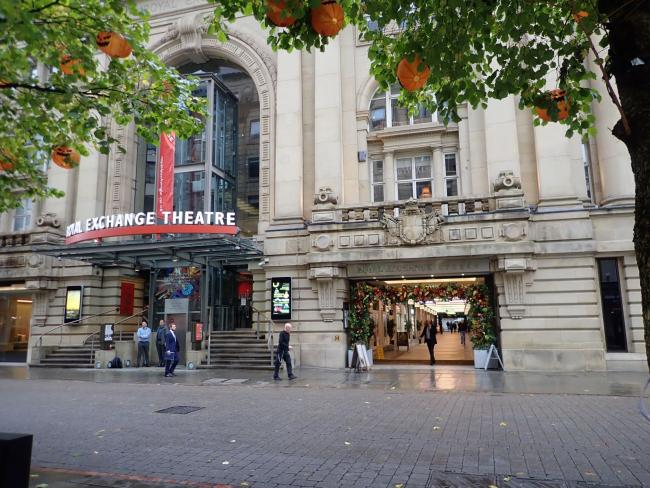22 October 2024

Royal Exchange Theatre, St Ann’s Square, Manchester. Photo Eirian Evans via geograph.org.uk (CC BY-SA 2.0).
A play in Manchester was cancelled in September after ideological disputes stoked division. Theatre management could not reach agreement with the director and company. This reflects both a climate of censorship and the invasion of dogmatic viewpoints disconnected with the British working class.
One of Britain’s leading theatres, the Royal Exchange in Manchester, has been forced to cancel its five-week run of A Midsummer Night’s Dream. The reason: failure to resolve an ideological dispute concerning two disparate and divisive issues – the foreign conflict between Israel and Gaza, and the home-grown issue of transgender recognition.
Slogans and solidarity
Reports in The Stage newspaper, the Manchester Evening News and the Guardian point to the use of pro-Palestine slogans painted on the scenery, with Shakespeare’s “trans politically conscious mechanicals” (the director’s words) rapping to chants of “Free Palestine” and solidarity with trans rights. The setting of the play was moved to the modern-day rave scene in Manchester.
Refusal by the director, Stef O’Driscoll, supported by the company, to withdraw aspects of the production judged controversial by the management meant there was no alternative but to close after the first preview.
Uneasy and artificial
What has all this to do with Shakespeare? While Shakespeare and the boy actors of his day were fascinated by the dramatic and sometimes comic possibilities of gender fluidity and identity (many of his plays involve cross-dressing for example), the same cannot be said of events in the Middle East since 1948: it is an uneasy and artificial juxtaposition.
Previews are useful indicators of audience and press reaction, exposing unforeseen problems. Concerns had arisen during the final week of dress rehearsals. Perhaps belatedly, it seems that the executive feared that the production, unaltered, could lead to a backlash.
This has happened elsewhere – 20 years ago in Birmingham for example – where protests of a political, religious or ethnic nature have led to nervousness and shutting down plays.
Growing trend
The director described management reaction as “knee-jerk censorship”. Speaking exclusively to The Stage, she said “I believe that what's happened to A Midsummer Night’s Dream is not an isolated incident but reflects a growing trend of censorship and fear-driven decision-making in the arts”.
The largely freelance cast and crew are reported to have had their losses covered by their unions, though casual front of house staff were not paid by the venue and lost three weeks’ pay. That does not entirely make up for disappointment and possible harm to careers.
Financial damage
The theatre has suffered considerable financial damage. Like theatres throughout Britain, it was still reeling from the effects of the pandemic, which kept audiences away.
Comments from subscribers to The Stage show there is public support for the executive’s decision. One writes: “Bravo to the team for pulling a show that takes easy political swipes at a sensitive current situation”.
‘There was clearly room for compromise and safeguarding the play’s run.’
O’Driscoll said her “'team and community felt devalued, invisible, problematic and unsafe”. A spokesperson for the building stated: “We want to work with artists who address complex issues”. They said they could permit mention of trans rights but not verbal expressions of “Free Palestine”. And the executive conceded they would allow general references to genocide and ceasefire. There was clearly room for compromise and safeguarding the play’s run.
O'Driscoll explained that in her view the drum-and-bass scene in Manchester was pro-Palestinian. “It's a clear part of the identity and culture...From the beginning of the process, all parties understood that the intention of the production was to represent this culture.”
This raises the question: what is culture and whose culture is it? Today in Britain a small minority think transgenderism should dominate the conversation. And it is a small minority who by proxy bring foreign conflict to Britain’s public spaces.
Cultural engineering
It is doubtful that such cultural engineering arises from the ranks of ordinary British workers. But British workers would defend their right to speak – along with their own right to state the opposite view.
The actors’ union Equity asserts there is a growing culture of censorship, and recently passed a motion at TUC conference affirming that “artists and arts organisations should be free to critique institutions and bring attention to issues through overtly political art without fear of censorship or losing their public funding”.
Risk
For example, Arts Council England, has warned of the risk to theatres of “artistic and creative output that might be deemed...overtly political or activist and goes beyond your company’s core purpose”.
Regional theatre has changed over the past 40 years. Now directors have greater licence to set their personal stamp on a production – independent of theatre management, writers and actors, who tend to be more in tune with local audiences.
Closer cooperation
Within the profession it is being asked whether events in Manchester could have happened if the artistic director’s role was integrated into the hierarchical structure, enabling closer cooperation between creatives and executive.
Really the play should not have been cancelled. It is a measure of the invasion of dogma into our class that it had to be. So far workers as a whole have withstood attempts to divide them. But it takes only a small number of demonstrators to stop a play.
